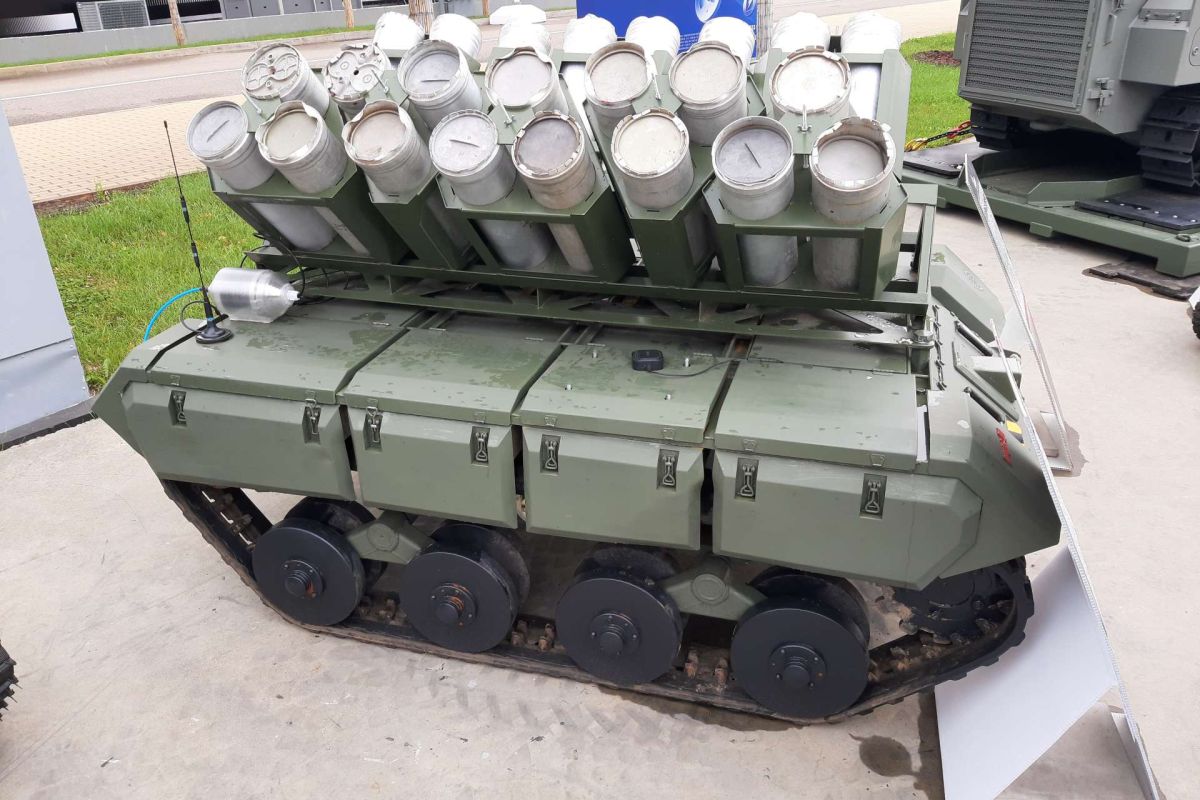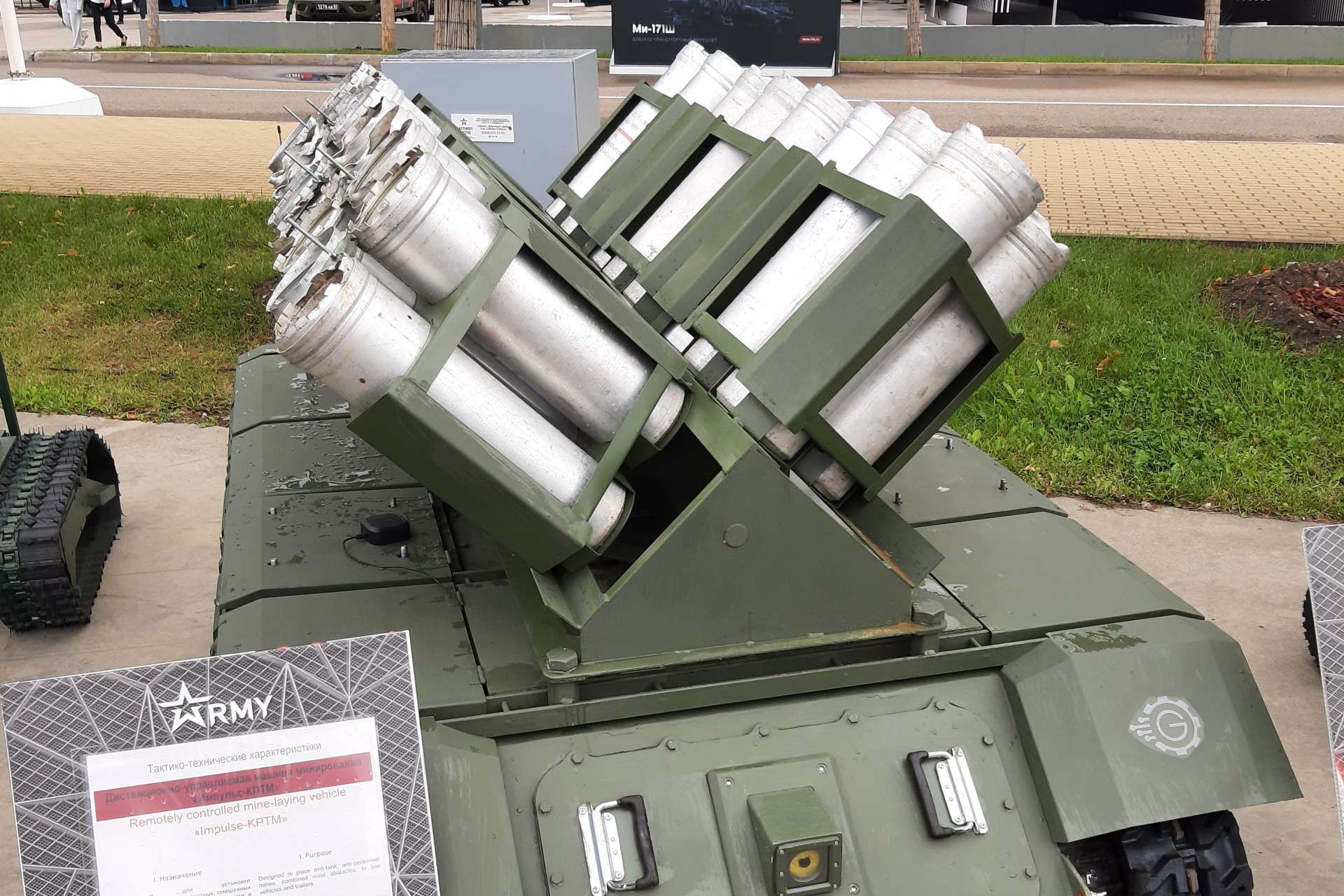Breaking News
New Russian Impulse-KPTM UGV can scatter up to 120 anti-tank and anti-personnel mines.
At the Army-2024 exhibition, the Russian Army presented the "Impulse-KPTM," a new unmanned ground vehicle (UGV) designed for mine-laying operations. This UGV is fitted with 30 launch barrels, each capable of housing various mine dispensers, allowing it to deploy up to 120 anti-tank and anti-personnel mines simultaneously to create different types of minefields. Additionally, the vehicle can tow various types of vehicles and trailers, enhancing its operational flexibility.
Follow Army Recognition on Google News at this link

The Impulse-KPTM can achieve a maximum speed of 10 kilometers per hour and can climb slopes with gradients of up to 25 degrees, powered by engines with a combined output of 20 kilowatts.(Picture source: Russian social media)
The Impulse-KPTM can reach a maximum speed of 10 kilometers per hour and is capable of climbing slopes with a gradient of up to 25 degrees. It can handle a maximum roll angle of 15 degrees, enabling it to traverse various terrains. The vehicle's launch barrels can accommodate mine dispensers such as the KPOM-3, KPTM-3, and KPTM-4. It is powered by engines with a combined output of 20 kilowatts, allowing for continuous operation of up to four hours. The vehicle has a total weight of 1,350 kilograms.
For communication, the Impulse-KPTM utilizes a radio control channel that can receive video information and transmit control signals over a line-of-sight distance of up to 1,000 meters in open terrain. For extended range operations, it can switch to an optical cable control channel, enabling communication over distances of up to 20,000 meters.
Among the mine types that the Impulse-KPTM can deploy is the KPOM-3, a Russian-designed mine dispenser that releases POM-3 anti-personnel mines. Each KPOM-3 dispenser contains four POM-3 mines, which are equipped with seismic sensors to detect vibrations, such as footsteps. The POM-3 mines measure 200 millimeters in height and 60 to 70 millimeters in diameter and weigh 1.3 kilograms. Upon activation, the POM-3 mine disperses approximately 1,850 fragments over an effective range of 8 to 13 meters. The dispenser is designed for remote deployment using systems like the Zemledeliye mine-laying vehicle. The POM-3 mines have a shelf life of 11 years and feature selective targeting mechanisms to reduce collateral damage.

This UGV is fitted with 30 launch barrels, each capable of housing various mine dispensers, allowing it to deploy up to 120 anti-tank and anti-personnel mines simultaneously to create different types of minefields. (Picture source: Russian social media)
The KPTM-3 is another mine type deployed by the Impulse-KPTM. This Soviet-era mine dispenser deploys PTM-3 anti-tank mines, which utilize a shaped charge to penetrate vehicle armor and are equipped with a magnetic influence fuze activated by changes in the magnetic field. Each PTM-3 mine weighs 8.5 kilograms when fully assembled and contains 1.8 kilograms of TG-40 explosive, a mixture of RDX and TNT. These mines are designed for wide-area deployment using various platforms, including truck-mounted and helicopter-mounted systems. The PTM-3 mines are programmed to self-destruct 16 to 24 hours after deployment to minimize the long-term risks associated with unexploded ordnance.
The Impulse-KPTM can also deploy KPTM-4 mines, which are contained in a dispenser holding two PTM-4 anti-tank shaped charge mines. Each PTM-4 mine weighs 3.25 kilograms and contains 1.4 kilograms of TG-40 explosive. The dimensions of the PTM-4 mine are 350 millimeters in length, 110 millimeters in width, and 55 millimeters in height. The PTM-4 mine is triggered by a non-contact magnetic igniter, the VT-14, which detects the magnetic field generated by nearby vehicles. These mines can be set to self-destruct after 8, 12, 24, or 48 hours and are programmed to automatically deactivate after 120 days to reduce the risk of unexploded ordnance.


























